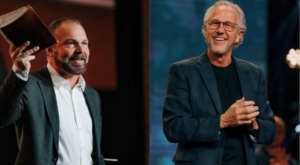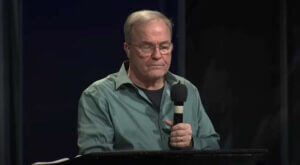The Gospel of Mark was the first of the four Gospels to be written, and its original ending seemed strange and abrupt. At a later date, a longer and more satisfying ending was appended; but Mark’s original conclusion to his Gospel narrative was simply this: “And they went out and fled from the tomb, for trembling and astonishment had seized them, and they said nothing to anyone, for they were afraid” (16:8, ESV). The End.
But how can that be the end? It’s so sudden, so abrupt, so lacking in resolution or explanation. We’re left with three women fleeing from the empty tomb, trembling, astonished and speechless. It’s as if the film in the projector simply ran out and we find ourselves sitting in the theater, puzzled by the unexpected ending.
Yet this was the original ending to Mark’s Gospel. Fear, trembling and astonished silence. Of course we understand why eventually the need was felt to add a more thorough ending (17 additional verses), as the other Gospels have. There needed to be a further explanation of the empty tomb.
Christian theology in its essence is the extrapolation of implications based on the resurrection of Jesus Christ. The book of John, the last Gospel written, has two full chapters after the Resurrection account. There is much to be written about, thought out, worked out; in fact, this is what the New Testament epistles are—the outworking of Resurrection implications.
But! … Mark’s original ending was the perfect way to end the first Gospel, if only for a while. Astonishment accompanied by fear and trembling, evoking stunned silence should be our first response to the gospel! Just think how unsatisfactory it would have been if Mary Magdalene had calmly said, “Oh, yes, this makes perfect sense”—and then gone on to give the other two women some erudite explanation like a German theologian giving a university lecture. If explanation had been the first response to the Resurrection, something would have been wrong.
And something is wrong!
What’s wrong is that we have precious little astonishment in our modern gospel. We’re familiar with it. It’s in danger of degenerating into cliche. It has only the faux astonishment of a late-night infomercial. For only $19.95! But wait, there’s more! Call now! We yawn and change the channel. I’m afraid that’s how our gospel is too often heard.
But consider how the gospel sounded upon its first hearing in the first century: A Galilean Jew named Jesus was executed by crucifixion by the Roman government for alleged crimes against the state; three days later God raised Him from the dead; He is now the world’s new emperor.
That’s the gospel! It’s not an explanation; it’s an announcement. It may sound absurd, but it’s certainly not cliché. No matter what else one might say about this gospel, it is certainly an astonishing claim.
But in our modern sophistication we have replaced astonishment with something a bit tamer. We have made the gospel reasonable, sensible and practical. We explain the gospel in cogent terms such as “the plan of salvation” and “spiritual laws”—as if it is simply the most rational thing in the world.
The gospel is now commonsense, logical and, most of all, “useful.” We have no use for astonishment because, well, we have no use for astonishment. Astonishment is not something we can use—it’s not something pragmatic we can make use of to further our self-concocted and self-oriented agendas. So instead of announcing an astonishing gospel, we find ourselves trying to sell a useful gospel. Evangelism takes on the tone of a multilevel marketing presentation. Some buy it, some don’t; but not many are astonished.
Yet astonishment is the most appropriate initial reaction to the gospel story (and it is a story, not a set of propositions). What if the three women at the tomb on the first Easter had calmly responded to the angel with a series of consumerist questions like this: “What do I do with this?” “How do I use it?” “How can I make this practical in my life?”—as if the angel had just presented them a business plan.
No! The gospel properly proclaimed and properly heard is a mystery evoking awe; it’s not a prospectus-eliciting calculation. Without astonishment as our initial response, we meet Christianity in a wrong way—or more properly, we meet Christ in a wrong way.
Without astonishment we inevitably reduce the gospel to inert “-ology” and “-ism.” Or worse, it becomes a spiritual “product” that we must “market.” This is consumer Christianity, and it is the bane of our age. Perhaps we actually believe the gospel is a kind of product. God help us! We need to once again be astonished like the three women on that first Easter—not by what the gospel can do, but first of all for what it is!
Throughout the second half of the 20th century, and now into the 21st century, American evangelicals have increasingly touted the virtues of the gospel by promoting it as “practical.” This has become something of an article of faith. It is unquestioned and fully assumed that we should make the gospel practical.
The goal of every sermon is to give a practical way of applying it to your life. We even speak of making the Bible “relevant.” (How grateful God must be that someone has at last made his Word relevant!)
But do we fail to see that this is the secular language of the market and not the sacred language of mystery? This is the language of consumerism, not the language of Christianity. This is the language of business, not the language of faith.
Of course the argument is: How are we going to get any takers if we don’t sell the gospel on practical grounds? How indeed?
Perhaps we will have to place some faith in the gospel and in Jesus Christ Himself. Perhaps we will have to believe that the gospel story itself, faithfully told, still has the capacity to astonish. Perhaps we will have to believe that the risen Christ can still make Himself known in astonishing ways.
See an error in this article?
To contact us or to submit an article



















